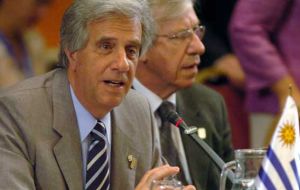MercoPress. South Atlantic News Agency
Botnia start up has Uruguay/Argentina relations on the cliff
 Pte. Dr. Tabare Vazquez
Pte. Dr. Tabare Vazquez Uruguayan president Tabare Vazquez blamed Argentina's reluctance to end the pickets blocking access to bridges linking with Uruguay as the main reason for the collapse of dialogue and his decision to give the start up authorization for the Botnia pulp mill built along a river shared by the neighboring countries and which Argentina openly objects.
Speaking on Friday from Santiago, in the framework of the Ibero-American summit Vazquez emphasized that from the very start of the dispute over the 1.2 billion US dollars project financed by Finland's Botnia, Uruguay's position has been that with blocked bridges "there's no negotiation possible", but "we're always open to a dialogue". Since the launching of the project, Argentina has objected on legal and environmental grounds and initially sponsored, --and local authorities helped finance--, pickets from the city of Gualeguaychu, across from Fray Bentos where the pulp mill has been built. Pickets have been protesting blocking access to Uruguay for over two years. Uruguay argues it kept Argentina informed of the project as the 1975 Uruguay River joint management treaty demands, and insists the plant has been built following European Union standards with minimum risk for the environment. Nevertheless Argentina two years ago decided to take the case to the International Court of The Hague accusing Uruguay of ignoring the 1975 treaty. A year ago on requests from President Kirchner, the King of Spain agreed to send one of his realm's best diplomats to help with "dialogue facilitating efforts". "We accepted to take the case to The Hague, we accepted the King's dialogue efforts, for which we are most grateful, we also invited Argentine to participate in the pollution monitoring committees and process, and on Thursday Argentina arrived to the meeting with no new initiative, what else could I do than order the start up of the Botnia plant?", said Vazquez. Furthermore not long after arriving in Santiago Argentine president Nestor Kirchner attitude of openly supporting and identifying himself with a delegation of picketers that had traveled to Chile to continue with their protests and telling them he was one of them, "had not been at all constructive", he added. "So if the path chosen has been The Hague, let it be The Hague and let us wait for the ruling", underlined Vazquez. Earlier in the week on request from Spain, Uruguay had suspended the start up announcement for the Botnia plant. However Vazquez' decision was communicated to Montevideo Thursday evening before the opening speeches of the summit when he praised Spain for its dialogue facilitating efforts and called for reconciliation with Argentina and hugged with President Kirchner and the elected president Mrs. Kirchner. But when the news bounced back in Chile the Argentines were furious and the Spanish delegation surprised and taken aback, leaving the King and his diplomats in an uncomfortable situation. Friday morning in the first session of the summit and following his speech, Kirchner said he didn't understand certain "unilateral" actions and non consulted attitudes and openly apologized to the King for having asked him to help the neighboring countries re-establish dialogue. President Vazquez then replied that Uruguay was always open to dialogue and insisted that the only "illegalities" in the Botnia dispute are the pickets and the blockade. He then went on to compare the pickets blocking bridges to Uruguay to the US blockade of Cuba "which our fellow Cuban vice-president Carlos Lage has so well described in all its painful consequences". The two presidents then happened to meet in the corridors of the summit's convention center and Vazquez tried to explain why his decision, basically arguing "we're a small country and you've forced me to do what I did, we're always the weak side". Allegedly Kirchner replied "don't play the role of the victim, you've gone far beyond the line and stabbed the Argentine people in the heart, and the King's trust". And he added, "we were trying to get dialogue going and you made fun of me!" The Argentine delegation was particularly offended with the comparison with the Cuban blockade, "it's a lack of respect for the president and all Argentines". In Buenos Aires the Uruguayan ambassador was called to the Foreign Office and handed a letter of protest stating that the unilateral decision to give the start up to Botnia-Orion without waiting for the International Court ruling is further evidence of the "illegitimate conduct of Uruguay", which has been expressed since it decided to ignore the 1975 treaty. The protest letter also accuses Uruguay of extending the operational certification to Botnia in the middle of the facilitating efforts of the King of Spain and the Spanish government, frustrating the whole endeavor. "The relation between Argentina and Uruguay has been definitively badly damaged," said President Kirchner's top aide, Cabinet Chief Alberto Fernandez. In Gualeguaychu environmentalist Roberto Cagnoli standing watch on the Argentine side of the border promised that "the struggle will continue" adding that "there's no doubt this will contaminate the environment and destroy our quality of life. You can be sure that will be here demonstrating with our families tomorrow and as long as it's needed".




Top Comments
Disclaimer & comment rulesCommenting for this story is now closed.
If you have a Facebook account, become a fan and comment on our Facebook Page!